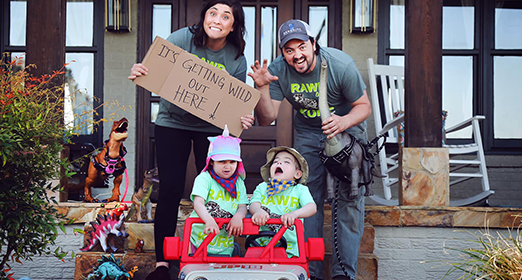Editor’s note: Jessica Davenport of Muscle Shoals, Alabama is the proud mom of Kruz, 6, and Paizlee, 5, who have a rare and fatal form of dwarfism called Schimke immuno-osseous dysplasia (SIOD). Kruz and Paizlee receive ongoing care at Packard Children’s. Last year, both children received successful stem cell transplants, and Kruz also received a kidney transplant to combat the devastating effects of SIOD. Now the family is awaiting a similar life-changing kidney transplant for Paizlee. Below, Jessica shares how her family’s medical journey has been impacted during the COVID-19 pandemic.
Can you share a bit about your recent trip to Packard Children’s, and how COVID-19 disrupted Paizlee’s hoped-for kidney transplant?
When we left Alabama on February 29, we knew of the growing impact of COVID-19, but we did not expect for the coming weeks to have a turn for the worst. Prior to her kidney transplant date, which was scheduled for March 15, we spent a few weeks doing testing for my husband (the kidney donor) and Paizlee. During those weeks, the COVID-19 crisis escalated quickly into forcing our doctors to make hard decisions. We had waited for this extremely important day for so long, and now we were having to choose between safety and our daughter’s life-changing kidney transplant.
What does a typical day look like caring for Kruz and Paizlee back home in Alabama, and how has COVID-19 changed that?
Honestly, every sickness is COVID-19 to us. We have lived in quarantine for four years. The only months we were able to get “out” was April through September, when flu season died down. With COVID-19, the precautions we take daily haven’t changed much, we just add extra steps to ensure safety.
Three days a week we have dialysis [at a hospital in Birmingham]. I keep our children in a covered wagon with n95 masks on when traveling through the hospitals. I wear a mask myself, and I use a disinfectant wipe to press elevator buttons or open doors. Paizlee has to wear her mask during the entire dialysis treatment, as well as her nurses. I wipe down anything she may touch and we try to keep her as happy and with as much of a sense of normalcy as possible during the session. After dialysis, I wipe everything again, put her in the wagon, use a disinfectant wipe to get out of the hospital, and then once we arrive at the car, I have to spray everything with Lysol, including our backpack, lunch box, blankets, and our wagon. Even though we’ve washed hands several times throughout the day, I always make sure to sanitize her hands. Keeping our children’s hands clean is our number one priority through this pandemic. Once we arrive home, it’s the same process of disinfecting before anything enters our home. We remove shoes at the door and immediately shower and give our children a bath and clean clothes.
What comes next for your family?
We are waiting for all this to pass while trying to keep Paizlee as safe as possible.
What would you say to donors who support the hospital on an ongoing basis, especially any donors who are stepping up their support in light of COVID-19?
Families need you. Families like ours are under more stress than the normal day. Not only fearing this virus, but fearing the loss of daily necessities that are vital to our children’s survival.
How does your Packard Children’s care team continue to support your family from afar?
Our doctors have been such a positive light for us during this time. It’s easy for our minds to wonder how long will we have to wait for Paizlee’s new kidney, and what if it gets so much worse. But they remind us we’re okay, we’re safer at our home in Alabama, and this will pass. We will get the kidney transplant when the timing is right.
Editor's update: We are so thrilled to announce that when procedures resumed at Packard Children's, Paizlee was able to receive her new kidney on June 17, 2020. Both Paizlee and kidney donor dad Kyle are both doing very well and the entire Davenport family is back home in Alabama, grateful for their research and care teams at Packard Children's, and the wonderful donors who support them.
